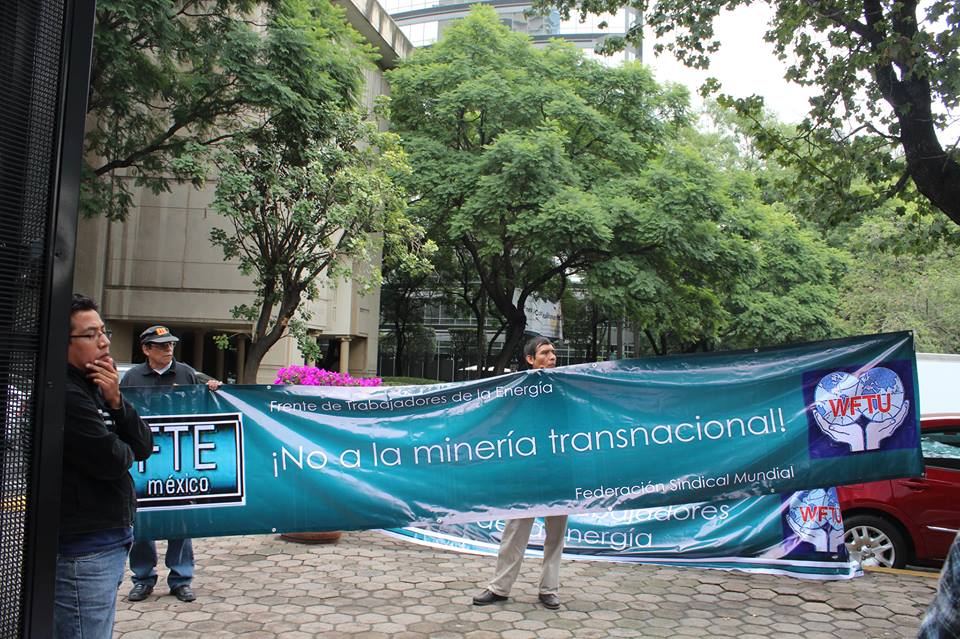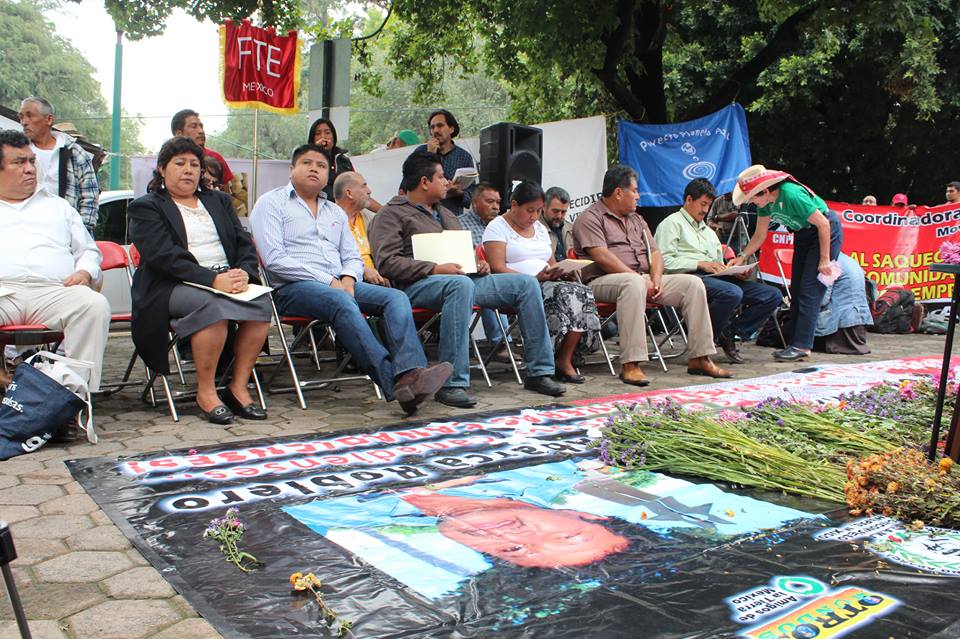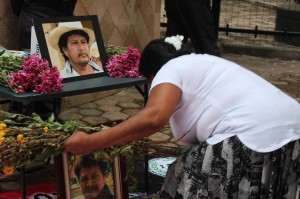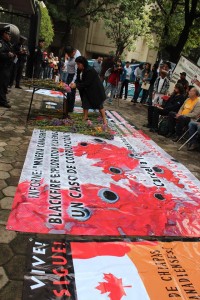In late August, the family of murdered activist Mariano Abarca travelled from Chiapas to Mexico City to present the report “Corruption, Murder and Canadian Mining in Mexico: The Case of Blackfire Exploration and the Canadian Embassy.”

In public and private meetings, including with representatives of the Canadian Embassy in Mexico, the family expressed their hurt and anger over findings that the Canadian Embassy provided support to Blackfire Exploration – despite being aware of growing opposition to the mine, threats and violence against mine opponents, and serious allegations of human rights violations and corruption at the company’s operations in Chiapas.
“My husband spoke out in front of the Canadian Embassy to tell representatives of the Embassy what was going on, and to indicate that his life was in danger,” stated Mirna Montejo, Abarca’s widow, during a public demonstration in front of the Embassy on August 21st.
 “They paid no attention. If the Government of Canada – through its Embassy in Mexico – had intervened to ensure respect for the law and human rights regarding the operations of its companies abroad, my husband would not be dead. As such, the Embassy and its representatives are complicit in the murder of Mariano Abarca Roblero.”
“They paid no attention. If the Government of Canada – through its Embassy in Mexico – had intervened to ensure respect for the law and human rights regarding the operations of its companies abroad, my husband would not be dead. As such, the Embassy and its representatives are complicit in the murder of Mariano Abarca Roblero.”
Calgary-based Blackfire Exploration operated a barite mine in the municipality of Chicomuselo in the southern state of Chiapas from 2007 to late 2009, when the mine was shut down for environmental violations, mere days after the shooting murder of Mariano Abarca. Evidence that the company had been making direct payments to the personal bank account of the local mayor also surfaced around that time, leading to an investigation by the Royal Canadian Mounted Police that is still underway.
The report, “Corruption, Murder and Canadian Mining in Mexico,” is based on an analysis of hundreds of pages of Department of Foreign Affairs documents obtained through an access to information request.
In their visit to Mexico City, the family of Mariano Abarca requested that the Canadian Embassy take action to ensure that those ultimately responsible – the “intellectual authors” – of Abarca’s murder be brought to justice, and that the RCMP investigation be expedited and charges brought. They further urged the Embassy to press Canadian legislators to adopt corporate accountability measures regarding the overseas activities of Canadian mining companies in accord with Canada’s international human rights obligations.
When the family met with Canadian representatives at the Embassy in Mexico, however, the Canadian authorities offered no defence whatsoever for what took place between 2007-2010. They simply repeated the empty and all-too-familiar Canadian government line: “We encourage Canadian mining companies to respect local laws and human rights and to implement Corporate Social Responsibility programs.”
 Embassy representatives were asked if, at a minimum, they could speak with Mexican authorities in order to ensure protection for the lives of Mexican activists who are threatened or criminalized for speaking out against the operations and abuses of Canadian mining companies. They responded that this would be tantamount to interfering in Mexican sovereignty.
Embassy representatives were asked if, at a minimum, they could speak with Mexican authorities in order to ensure protection for the lives of Mexican activists who are threatened or criminalized for speaking out against the operations and abuses of Canadian mining companies. They responded that this would be tantamount to interfering in Mexican sovereignty.
In contrast, officials did not consider then-Ambassador Guillermo Ryschinski to have been interfering in Mexican sovereignty when he, on behalf of Blackfire Exploration, intervened with the Governor of Chiapas to support the company’s operations. As a Blackfire employee stated in an e-mail to the Embassy:, “All of us at Blackfire really appreciate all that the Embassy has done to help pressure the state government to get things going for us. We could not do it without your help.”
Embassy representatives also denied that to urge Mexican authorities to ensure the security and wellbeing of community members such as Mariano Abarca, and many others, would be appropriate in fulfillment of their mandate, which obliges them to promote universal respect for human rights – not just the economic interests of Canadian business. Although the Canadian government downplays it, the Department of Foreign Affairs mission statement mentions several “key objectives” in addition to “advancing Canada’s international trade and economic interests abroad.” They include “using diplomacy to protect against…environmental degradation [and] natural resource depletion,” and “the projection of Canadian values…such as the promotion of human rights…the rule of law [and] sustainable development.”
 As a signatory to seven international human rights conventions, and having endorsed the United Nations Declaration on the Rights of Indigenous Peoples, Canada is further obliged under international law to promote respect for human rights.
As a signatory to seven international human rights conventions, and having endorsed the United Nations Declaration on the Rights of Indigenous Peoples, Canada is further obliged under international law to promote respect for human rights.
In failing to do so and in failing to take responsibility for widespread threats, attacks, and criminalization against those individuals and communities that dare to fight for the wellbeing of their people and lands against unfettered mining expansion in which Canadian companies and authorities have staked out a major role, the Canadian government and the Canadian mining industry will surely soon have more blood on their hands.
HIGHLIGHTS FROM THE REPORT:
- The Embassy’s active and unquestioning support may have acted as a disincentive for Blackfire to comply with local and international laws.
- Second, in doing so, the Embassy failed to uphold Canada’s own policies, as well as its international obligation to promote universal respect for human rights.
- The picture pieced together is tremendously unsettling, especially given Canada’s role as a top investor in Mexico’s mining industry. Approximately 75% of the world’s mining companies are headquartered in Canada, and many of these companies are associated with serious conflict.
- In 2011, Canada’s Office of the Extractive Sector Corporate Social Responsibility (CSR) Counsellor reported that 204 of 269 foreign-owned companies in Mexico’s mining sector in 2010 were Canadian.
Canada’s prominent role in Mexico’s mining sector, and our findings in this case, lead us to make several recommendations, some of which are:
- That Canada create robust eligibility criteria for all government supports to mining companies, including ensuring respect for the free, prior, and informed consent of Indigenous communities and for binding democratic and participatory decision-making processes of non-Indigenous communities before mine prospecting and project development begins
- That Canada pass legislation to regulate Canadian mining companies operating abroad and provide affected communities with access to Canadian courts and an independent ombudsperson
- That Canada’s anti-corruption legislation be significantly strengthened and greater resources directed towards its enforcement
- That Canada instruct its embassies abroad to carefully assess the impacts of Canadian mining operations on affected communities to ensure that commercial interests never outweigh collective and individual human rights
- That Blackfire Exploration Ltd. renounce any future attempt to reopen the Payback mine in Chicomuselo, or open any other new mines in the state of Chiapas
Jennifer Moore is Latin America Program Coordinator at MiningWatch Canada and is a contributor to the Americas Program www.americas.org



